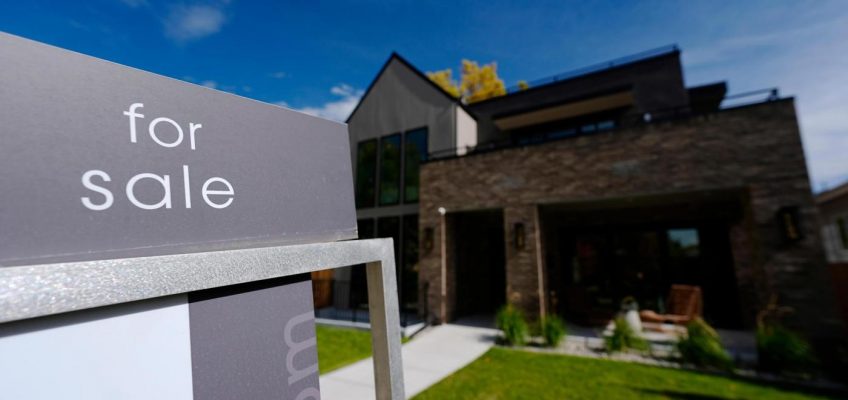By ALEX VEIGA, Associated Press Business Writer
LOS ANGELES (AP) — Homeowners eager to sell may have to wait a while before a buyer comes along.
As of April, the U.S. housing market had nearly 34% more sellers than buyers shopping for a home, according to an analysis by Redfin.
Aside from April 2020, when the pandemic brought the economy and home sales activity to a standstill, there haven’t been this few buyers in the market for a home before, based on records that date back to 2013.
The trend is good news for home shoppers — if they can afford to buy at current mortgage rates and prices, which are still rising nationally, albeit more slowly.
Fewer buyers means less competition for home listings and more pressure on sellers to dial back their asking price and make other concessions to help get a deal done. That’s a stark reversal from just a few years ago, when it wasn’t uncommon for homeowners to receive offers well above their asking price from multiple home shoppers.
Related Articles
Bloodhounds hunting ‘Devil in the Ozarks’ fugitive are seen as key part of manhunt
Oreo maker Mondelez sues Aldi, alleging grocery chain copies its packaging to confuse customers
Wall Street drifts toward the end of what may be its best month since 2023
US inflation gauge cools with little sign of tariff impact, so far
Today in History: May 30, Babe Ruth plays last major league game
“The balance of power in the U.S. housing market has shifted toward buyers, but a lot of sellers have yet to see or accept the writing on the wall,” said Asad Khan, a senior economist at Redfin.
The lopsided balance between buyers and sellers is reflected in home sales, which remain in a slump going back to 2022, when mortgage rates began to climb from the rock-bottom lows they reached during the pandemic. Last year, sales of previously occupied U.S. homes sank to their lowest level in nearly 30 years. Sales fell last month to the slowest pace for the month of April going back to 2009.
Sellers began outnumbering buyers in November 2023, when the average rate on a 30-year mortgage climbed to a 23-year high of nearly 8%, according to mortgage buyer Freddie Mac. The average rate reached 6.89% this week, its highest level since early February.
All told, there were 1.9 million sellers and 1.5 million prospective homebuyers in April, or 490,041 fewer people in the market for a home relative to sellers. A year ago, there were 6.5% more sellers than buyers. Two years ago, buyers outnumbered sellers by 5.3%.
Redfin based its estimate of the number of sellers in April on active listings, or the number of homes for sale at any point during the month. It estimated the pool of people in the market for a home by creating a model that takes several other data into account, including the typical time it takes for a someone to buy after taking a tour of a home.
Faced with a market with fewer potential buyers, some sellers have opted to lower prices or offer sales incentives, such as agreeing to pay for a buyer’s closing costs or other expenses. Nearly 1 in 5 home listings had their price reduced last month, according to Realtor.com.
The growing imbalance between buyers and sellers should pull U.S. home prices 1% lower by the end of this year, according to Redfin.
Prices have already begun to decline in select metro areas. In the four weeks ended April 20, home prices fell in 11 of the top 50 most populous U.S. metro areas, including Dallas, Oakland, California, and Jacksonville, Florida, according to Redfin.
The market with the biggest gap between buyers and sellers is Miami, where sellers outnumber buyers by about 3 to 1, according to Redfin. The strongest seller’s market is Newark, New Jersey, with 47.1% fewer sellers than buyers.
Despite tipping more in favor of buyers, the housing market is likely to remain unaffordable for many Americans. The median U.S. home sales price has jumped 53% over the past six years, far outpacing wage growth.
And while the inventory of previously occupied U.S. homes climbed last month to the highest level since September 2020, it’s still well below pre-pandemic era levels and short on properties that most Americans can afford.
Before the pandemic, households earning $75,000 a year could afford to buy nearly half of all homes on the market nationally. As of March, only 21.2% of home listings were affordable, according to a recent analysis by the National Association of Realtors. A home is considered affordable if monthly payments don’t exceed 30% of household monthly income.
“Without a significant boost in housing inventory at price points below $260,000, the path to homeownership will remain blocked for millions of Americans who are otherwise financially ready to buy,” according to the NAR report.


Leave a Reply